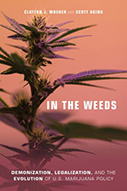In The Weeds: Demonization, Legalization, And The Evolution Of U.S. Marijuana Policy

Authors: Clayton Mosher and Scott Akins.
Publisher: Philadelphia: Temple University Press, 2019. 336p.
Reviewer: Jennifer Murphy | February 2021
In the Weeds is an ambitious book that attempts to make sense of the senseless policies the United States has employed regarding marijuana for nearly 100 years. While we are amidst change regarding marijuana policy in the United States, as well as the rest of the world, it is always important to look back and consider the events that led us to this moment. Mosher and Akins do an excellent job of summarizing key legislation, research, and controversies throughout marijuana prohibition. Their key argument is that the prohibition of marijuana is an historical anomaly, considering the long history of medical and recreational marijuana use around the world. The authors, in a sense, create an encyclopedia of marijuana policies, research studies, and controversies from the lead-up to the 1937 Marihuana Tax Act through today. Their scope is impressive: they manage to digest hundreds of reports and research studies, making them accessible to the average reader. They also trace and identify the moral crusaders on both sides of marijuana decriminalization and legalization debates, providing great context for the demonization themes and distortions that have persisted. The book ultimately provides a good reference for understanding the history and motivations of various policies over time.
Marijuana policies have shifted tremendously in the past few years; most states now permit medical and/or recreational marijuana and the number is expected to grow. The authors do a good job of breaking down the various policies across states and describing the process of legalization in different places, including the three countries that have legalized marijuana to different extents. While they do not necessarily uncover anything new for those who have studied U.S. drug policies, the consolidation of information in each chapter is a useful reference tool for scholars and students.
Mosher and Akins also recognize that the end of their book has not yet been written. They conclude with a much-appreciated analysis of several issues that remain for discussion and debate. One issue is the legal restrictions for marijuana dispensaries regarding financial services and their inability to claim business expenses on their taxes. Until marijuana is legalized at the federal level, it is not clear how they can operate as fully legitimate businesses. They also raise the issue of the possible corporatization of the business of marijuana, but they appear to dismiss this concern too quickly. Given the profits and influence of tobacco, alcohol, and pharmaceutical companies, it is reasonable to expect some cooptation of the marijuana industry. They dismiss this possibility because of the way marijuana is cultivated and see it more as a boutique industry. However, given the restrictions on who can operate dispensaries, and the financial requirements for obtaining a license in various states, I’m not convinced we can quickly disregard the concern about the corporatization of both medical and recreational marijuana. Their analysis for why this won’t happen is not convincing, although one hopes they are right.
Jennifer Murphy, Ph.D., Associate Professor and Program Coordinator, Criminal Justice, Penn State Berks


